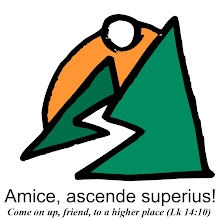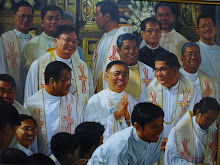
Sunday Morning Worship Guide & Reflection 17th Sunday in Ordinary Time, Year B July 26, 2009
Sin has caused so much alienation, division and disunity. Since Adam and Eve began hiding from the Lord in the garden after the first fall, humankind has gone a long way toward deepening and widening that primordial rift between and among peoples and nations. The last century that saw two great world wars, not to mention the so many little wars of attrition waged in so many places, and the coming into vogue of violent terroristic acts all over the world are a collective testament to the crying need for oneness. This utter lack of unity does not spare the world’s great religions, Christianity included, now divided into so many different denominations and aggrupations – and still counting!
Humanly speaking, there is no solution to this impasse! There is very little that humankind can do to make that elusive dream of generations become a reality. Kipling’s inspired aphorism seems to express this best: “East is east and west is west and never the twain shall meet!” Even within our home shores, our tiny nation of 7,100 islands is continually buffetted by the raging storms of ethnic and political strife, not to mention the sad fact that the Philippines, as one author describes it, is nothing more, nothing less than “an anarchy of families.” The past, present, and future of the Philippines, its welfare and well-being (or the gross lack of it), depend a whole lot on just a few family economic and political dynasties. The official mainstream economy, moreover, pales in comparison to the magnitude of the unofficial, so-called “underground” economy, that has remained the blight – and the single most important obstacle – to economic and social growth that would benefit the masses. Humanly speaking, there is no hope for such a sad state of affairs.
There was no hope either, from the purely human viewpoint, when the Lord asked Philip: “Where can we buy enough food for them to eat?” This, Philip knew as much, for in his quick mental math, he reckoned quite accurately: “Two hundred days’ wages worth of food would not be enough for each of them to have a little.” But hope is not human. It is divine. It comes from above. Our catechism teaches us that hope, along with faith and love, are so-called “theological” virtues, which have been infused in us in our baptism. Hope, like faith and love, is a gift from God, grace from above, beyond the mere mortal power of any human. This divine hope shines out well in Andrew’s well-meaning offer – the boy’s offering of five barley loaves and two fish, an offering reminiscent of the Old Testament’s offerings of first fruits, reminiscent, too, of the poor offering of two turtledoves of Mary and Joseph during the presentation at the Temple! Nothing is too insignificant for God when freely offered to Him! No offering ever is poor and worthless offering for God when it is given willingly and without reserve! The humanly impossible became possible on account of the “hopeful offering” of Andrew and the boy who gave his all. Bread was multiplied in order to be shared: “Then Jesus took the loaves, gave thanks, and distributed them … When they had had their fill, he said to his disciples, ‘Gather the fragments left over, so that nothing will be wasted.’”
Unity is God’s dream, before it was ours! Unity is God’s work prior to its becoming our own work. God Himself does the wonders, the miraculous multiplication in view of the sharing, along with the “gathering,” the unifying, the making of all of us caught in this sinful mess into one, single mass – the Church! Today, in this Mass, he gives us bread to share. And He gives us hope to spare! Truly, “the hand of the Lord feeds us; he answers all our needs!”


2 comments:
Speaking of unity or disunity in the Filipino political landscape, do you have something to say or to enlighten us regarding the entry of Fr. Ed Panlilio as a presidential candidate for 2010? Your opinion might be helpful to start a process of needed discernment.
Thanks,
Fr. Ariel Macatangay SDB
i can sympathize with this his wish to cast a different mold in the political arena. but unfortunately, he seems to become exactly the politicians he would like to replace. i cannot sit well with one, priest or lay, who seems to behave like he has a direct line to heaven, suggesting that the Lord has called him like He did Moses and the prophets of old. discernment is much too serious to be passed off with one liners like that. the first element to put into the fray called discernment is the element of basic rules found in canon law for us ordained ministers. all others sound to me too facetious and self-serving to start with
Post a Comment